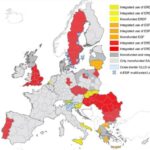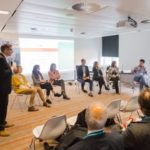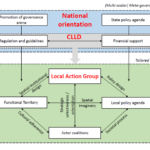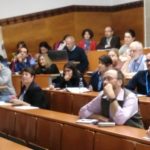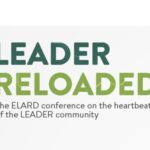At the LEADER/CLLD 2019 Conference, organised by ELARD and the Portuguese LEADER network Minha Terra, Loris Servillo and Stefan Kah presented a thorough study on the implementation of multifund-CLLD across EU member states and regions. The revised version of the report (January 2020) is available here.
LDnet 2020: State of Play in Local Development and much more …
Following on from our general assembly, we are going ahead with a number of new initiatives. We are planning a workshop on Social innovation and local development: linking urban and rural approaches. It will take place in 20 February 2020 in Brussels, on the conclusion of the SIMRA conference. Peter Ramsden will lead from the […]
A lively debate on ‘Capitalising on diversity in local development’ at EWRC2019
On 9 October 2019, as part of EWRC2019, LDnet, organised a workshop in partnership with ELARD on ‘Capitalising on diversity in local development’ under the theme ‘A Europe Closer to Citizen’. The workshop aimed at demonstrating that bottom-up approaches to local development, like CLLD, have succeeded in engaging ‘Unusual Suspects’; people left out of mainstream […]
The LEADER Approach and Social Innovation in Rural Areas – a Liaison?
R. Lukesch, H. Gassler, B. Ecker, L. Fidlschuster, M. Fischer, S. Mair, S. Philipp, N. Said[1] Abstract –The research project SILEA aimed at exploring the significance, extent and possible effects of Social Innovation in the framework of the LEADER Measure of the Austrian Rural Development Program 2014-20. The study leaned onto a complex mix of […]
LDnet General Assembly: New initiatives for 2019-2020
This year’s general assembly of the LDnet association took place on Tuesday 8 October 2019 in Brussels, with teleconferencing facilities allowing members and friends not present in Brussels to participate remotely. In addition to the normal business of the general assembly, there was a wide-ranging debate covering several topics led by colleagues, including: Building bridges […]
Resilient Villages: “Vibrant rural communities are not afraid to take risks”
In his current research, LDnet board member, Alistair Adam-Hernández examines why some rural communities are able to adapt to change better than others. During the European Rural Sociology Conference 2019, “Rural Futures in a Complex World” in Trondheim (NO), an international group of social scientists discussed how this concept could enable rural communities to harness […]
Debating CLLD as experimental governance and task-specific space for policy action
The Community-Led Local Development (CLLD) instrument is one of the most interesting “territorial delivery mechanisms” of the current EU 2014-2020 programming period. Built on the former LEADER project, it attempts to overcome the sectorial (rural or maritime) approach of the previous instrument through a more integrated local-development policy agenda for ad-hoc sub-regional and urban areas. […]
Strengthening the impact of research on EU local development policies: towards a community of experts
On 6 June 2019, LDnet organised a special session at the annual conference of the RSA in Santiago de Compostela on the topic of “Strengthening the impact of research on EU local development policies”. The LDnet workshop presented the opportunities and challenges of involving the research community in designing and analysing EU local development policies, […]
Urban CLLD – The case of FatorC in Cascais, Portugal
CLLD Community Led Local Development (CLLD) is a territorial bottom-up approach, through which Local Development Strategies (LDS) are implemented. Local communities are encouraged to participate in the decisions about the implementation of community funds, by identifying the needs and challenges faced with in its area, proposing solutions and defining projects. The community is represented by […]
Overcoming EU Discontent in ‘Places That Don’t Matter’ through Community-Led Local Development
The past year has certainly been a particularly difficult one for the strength and cohesion of the European Union. The outcomes of local and national elections in many countries unveiled not only the emergence of new populist and nationalist movements and governments all across the Union, but also a growing disbelief in the European project […]
A powerful contribution on the future of local development in the EU
A major contribution by Yves Champetier has been published by AEIDL entitled Europe: a major player in the development of territories. In this Yves offers a personal account and an overview of the progress that has been made over the last 40 years and the challenges facing us today. In his article he concludes: A […]
CLLD/Leader: Past, present and future
In this wide-ranging paper Robert Lukesch goes back to the precursors of Leader and looks at each stage of its evolution, highlighting the complex principles behind this approach (“more than the seven features and usual clichés”) and discussing success factors. He takes us to the current CLLD/Leader period and looks at what lies ahead. He […]
